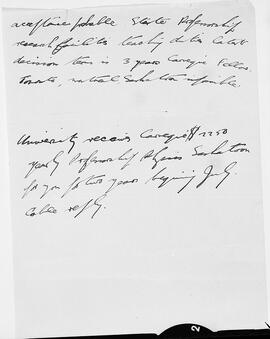Image of handwritten note confirming a grant from the Carnegie Foundation to fund a Professor of Physics at the University of Saskatchewan for two years. This position was filled by Gerhard Herzberg.
Bio/Historical Note: Gerhard Heinrich Friedrich Otto Julius Herzberg, PC CC FRSC FRS (1904-1999) was a German-Canadian pioneering physicist and physical chemist, who won the Nobel Prize for Chemistry in 1971, "for his contributions to the knowledge of electronic structure and geometry of molecules, particularly free radicals.” Herzberg's main work concerned atomic and molecular spectroscopy. He is well known for using these techniques that determine the structures of diatomic and polyatomic molecules, including free radicals which are difficult to investigate in any other way, and for the chemical analysis of astronomical objects. Herzberg served as Chancellor of Carleton University in Ottawa, Ontario, Canada from 1973 to 1980. Initially, Herzberg considered a career in astronomy, but his application to the Hamburg Observatory was returned advising him not to pursue a career in the field without private financial support. After completing high school at the Gelehrtenschule des Johanneums, Herzberg continued his education at Darmstadt University of Technology with the help of a private scholarship. Herzberg completed his Dr.-Ing. degree under Hans Rau in 1928.
From 1928 to 1930 he carried out post-doctorate work at the University of Göttingen under James Franck and Max Born and the University of Bristol. In 1930 he was appointed Privatdozent (lecturer) and senior assistant in the Physics Department of the Darmstadt Institute of Technology. In August 1935 Herzberg was forced to leave Germany as a refugee and took up a guest professorship at the University of Saskatchewan, for which funds had been made available by the Carnegie Foundation. A few months later he was appointed research professor of physics, a position he held until 1945. From 1945-1948 Herzberg was professor of spectroscopy at the Yerkes Observatory of the University of Chicago. He returned to Canada in 1948 and was made Principal Research Officer and shortly afterwards Director of the Division of Physics at the National Research Council. In 1955, after the Division had been divided into one in pure and one in applied physics, Herzberg remained Director of the Division of Pure Physics, a position which he held until 1969 when he was appointed Distinguished Research Scientist in the recombined Division of Physics.
Herzberg's most significant award was the 1971 Nobel Prize in Chemistry, which he was awarded "for his contributions to the knowledge of electronic structure and geometry of molecules, particularly free radicals.” During the presentation speech, it was noted that at the time of the award, Herzberg was "generally considered to be the world's foremost molecular spectroscopist."
Herzberg was honoured with memberships or fellowships by a very large number of scientific societies, received many awards and honorary degrees in different countries. The NSERC Gerhard Herzberg Canada Gold Medal for Science and Engineering, Canada's highest research award, was named in his honour in 2000. The Canadian Association of Physicists also has an annual award named in his honour. The Herzberg Institute of Astrophysics is named for him. He was made a member of the International Academy of Quantum Molecular Science. Asteroid 3316 Herzberg is named after him. In 1964 he was awarded the Frederic Ives Medal by the OSA. At Carleton University, there is a building named after him that belongs to the Physics and Mathematics/Statistics Departments, Herzberg Laboratories. Herzberg was elected a Fellow of the Royal Society (FRS) in 1951. The main building of John Abbott College in Montreal is named after him. Carleton University named the Herzberg Laboratories building after him. A public park in the College Park neighbourhood of Saskatoon also bears his name.
Herzberg authored some classic works in the field of spectroscopy, including Atomic Spectra and Atomic Structure and the encyclopaedic four volume work: Molecular Spectra and Molecular Structure, which is often called the spectroscopist's bible. The three volumes of Molecular Spectra and Molecular Structure were re-issued by Krieger in 1989, including extensive new footnotes by Herzberg. Volume IV of the series, "Constants of diatomic molecules" is purely a reference work, a compendium of known spectroscopic constants (and therefore a bibliography of molecular spectroscopy) of diatomic molecules up until 1978. Herzberg died in 1999 in Ottawa.

